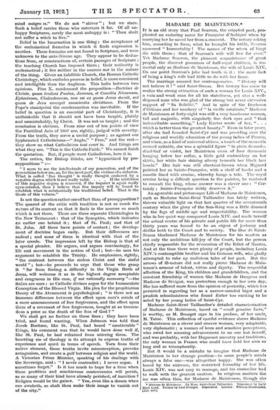MADAME DE MAINTENON.* IT is an old story that Paul
Scarron, the crippled poet, pro- phesied an enduring name for Francoise d'Aubigne when by marrying her he saved her from a convent. The notary asking him, according to form, what he brought his bride, Scarron answered " Immortality 1 The names of the wives of kings die with them ; that of Scarron's wife will live for ever." Yet Madame Scan-on, the pleasant acquaintance of great people, the discreet governess of half-royal children, is im- mortal only as Madame de Maintenon, the wife of Louis XIV. On one point Scarron's joke had truth in it : the mere fact of being a king's wife had little to do with her fame.
The marriage amazed her contemporaries. " History will not believe it 1 " said Saint-Simon. But history has come to realize the strong attraction of such a woman for Louis XIV., a vain and weak man for all his stateliness, yet also a well- disposed man who was glad of the strong but never obtrusive support of " Sa Solidite." And in spite of the Duchesse d'Orleans and her mockery of " la vieille ratatinee," Madame de Maintenon at forty-eight was still a very handsome woman, tall and majestic, with singularly fine dark eyes and " that indescribable something," Lady Exeter wrote of her, " . . . which is better than the greatest beauty." Even in later years, after she had founded Saint-Cyr and was presiding over the religious and worldly education of the young ladies of France, and when, as a kind of universal abbess, a touch of the monastic seemed suitable, she was a splendid figure " in plain damasks, dead-leaf or violet, her Maintenon cross of four diamonds hanging below her collar, a little gold embroidery on her skirts, her white hair shining silvery beneath her black lace hoods." Her hair was still chestnut-brown when Mignard painted her as Sainte-Francoise, with a shelf of books and a mantle lined with ermine, whereby hangs a tale. The-royal ermine being a difficult question to the painter, he ventured to consult the king, whose answer was a clever one : " Cer- tainly ; Sainte-Francoise richly deserves it."
An agreeable and picturesque Life of Madame de Maintenon, such as Madame Saint-Rene Taillandier has lately written, throws valuable light on that last quarter of the seventeenth century when the glory of the Sun-King was a little dimmed by the fogs of middle age and respectability. The woman who in her quiet way conquered Louis XIV. and made herself the actual centre of his private and public life for more than thirty years was bound to be an object of jealousy and dislike both to the Court and to society. The Due dc Saint- Simon blackened Madame de Maintenon for his readers as not only the ambitious kill-joy of the Court, but the person chiefly responsible for the revocation of the Edict of Nantes. And at the time there were plenty of people, including Louis XIV.'s contemptible brother and his German wife, who gladly attempted to rake up malicious tales of her past. But the arrows of ill-nature did not really pierce Madame de Main- tenon's armour of talent, virtue and dignity. The respectful affection of the King, his children and grandchildren, and the constant friendship of women like Madame de Dangeau and Madame di Sevigne, was protection enough in her own day. She has suffered more from the opinion of posterity, which has persisted in regarding her as a narrow-minded bigot and a prudish schoolmistress who found Esther too exciting to be acted by her young ladies of Saint-Cyr.
Madame Saint-Rene Taillandier's detailed characterization of Madame de Maintenon, based on " small genuine facts," is worthy, as M. Bourget says in his preface, of her uncle, M. Taine. This collection of careful evidence shows Madame de Maintenon as a clever and sincere woman, very adaptable, very diplomatic ; a woman of keen and sensitive perceptions, who owed her amazing advancement to no one but herself, and was probably, with her Huguenot ancestry and traditions, the only woman in France who could have held her own so long and so triumphantly.
But it would be a mistake to imagine that Madame de Maintenon in her strange position—to some people's minds always a false one—was altogether happy. She was often bored by the extreme, the restricted formality of her life. Louis XIV. was not easy to manage, and his counsellor had to walk with the greatest caution. In religious matters the ice was often thin, for Madame de Maintenon, though she
• Madame de Maintenon. By Mme. Saint-Rene Taillandler. Traastated by Lady Mary Loyd. Preface by Paul Bourget. Illustrated. London : William lieineroasut, Lisa. net.]
understood and shared the desire of the Gallican Church for a national unity, never quite forgot her own origin, and it is certain, according to her biographer, that if she did not, as indeed she could not, oppose the expulsion of the Huguenots, she had no hand in actually persuading the King to a measure which was demanded by the majority of the nation.















































 Previous page
Previous page